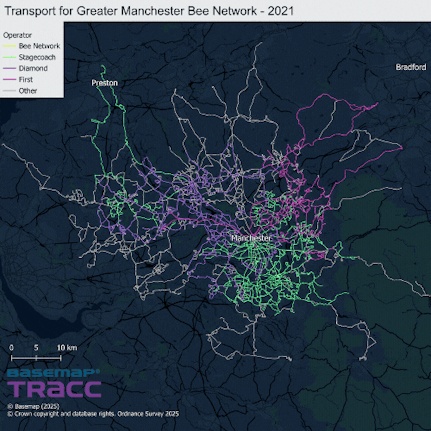
Franchising Buses & the Power of Data: Key Takeaways from RTIG’s Event
On 11th February we attended RTIGs event focused on franchising bus services and the importance of data. With Transport for Greater Manchester having recently brought all local bus services under local control and Cambridgeshire and Peterborough Combined Authority recently announcing their plans to franchise, it’s a topic on many minds within the UK bus sector. With speakers from transport bodies such as TfGM and TfWM, and suppliers such as INIT and ITO World, there was a wealth of knowledge eager to be shared.
The morning began with a focus on how bus franchising has been done so far, both in Greater Manchester but also further afield such as Nevada in the United States and Wellington in New Zealand. These presentations showed the differences in how franchising can suit different areas differently and how sometimes it is necessary to delay franchising temporarily to avoid a ‘busastrophe’ and a loss in public confidence. A recurring topic was the importance of decisions about the allocation of risk within a franchise and how this needed to be managed to ensure franchised bus services provided the best service for passengers.

The Bee Network
Back in November we used route line data from Datacutter to show how the Bee Network had expanded between 2021 and 2024 as part of the 30 Day Map Challenge. Since this analysis the Bee network has further expanded to cover the whole of Greater Manchester.
Following lunch, presentations were given to show the importance of data quality when franchising. With multiple sources of data for figures such as operating miles, it is important to decide on a single source of truth and ensure that this is understood. The concept of the stop zone for determining when a bus has arrived or departed a stop was also explained, as well as the importance of ensuring this is the right size to avoid overlapping zones or the impact of signalized junctions.
The day was rounded off by Transport for West Midlands and ito World reminding us that at the end of the day, the passenger must be the priority. With passengers being a mixture of those who have little choice but to take the bus and those who have a choice of modes, it is important that all needs are met as well as possible, with seamless, responsive and tailored services which are reflective of demand and aligned to public values such as sustainability.
As more local transport authorities make the move towards franchising, it will be great to see how the topics covered are taken into account and knowledge of best practice is shared. With tools such as TRACC these decisions can be well informed through thorough option analysis and quantifying the impacts of route changes.